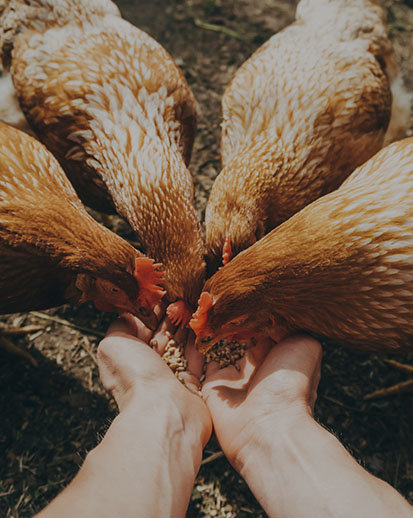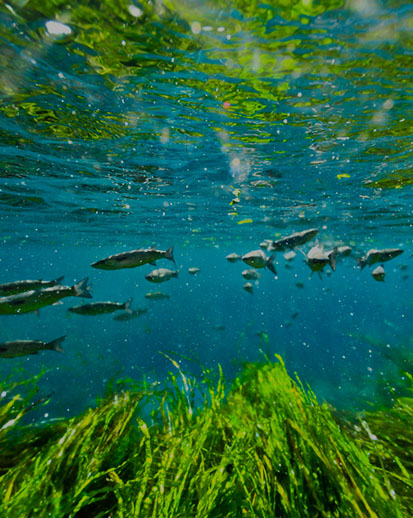Nature & biodiversity
Like every business in the world, we both impact and depend on nature and biodiversity. The healthy functioning of the world’s atmosphere, oceans and freshwater systems supplies us with oxygen, food, clean air and water, along with a host of other ecosystem services. It also helps mitigate the effects of climate change by absorbing carbon. We acknowledge our role to protect and restore nature and biodiversity, and fully support the ambitions of the UN Convention on Biological Diversity.
|
|
2022 |
|
2021 |
||||||
|---|---|---|---|---|---|---|---|---|---|---|
|
|
|
|
|
||||||
Protected Areas1 |
|
|
|
|
||||||
Sites in or adjacent to protected areas |
|
34% |
|
28% |
||||||
Sites in registered protected areas |
|
2% |
|
2%2 |
||||||
|
|
|
|
|
||||||
Volatile Organic Compounds (VOC, x 1,000 tons) |
|
4.6 |
|
4.1 |
||||||
|
||||||||||
Biodiversity
Biodiversity loss is driven by human activity. According to the Intergovernmental Science-Policy Platform on Biodiversity and Ecosystem Services (IPBES) Global Assessment, one million of the eight million animal and plant species are now threatened with extinction. We address our impacts on biodiversity and natural ecosystems across the value chain through our DSM Responsible Care Plan, tackling the main drivers of loss, especially through our GHG emissions reduction, water stewardship and waste management programs, as well as through our commitment on deforestation-free supply chains for our primary raw materials.
Monitoring biodiversity across our value chain
At DSM, we assess and monitor areas of high biodiversity around our sites. In 2022, 34% of all our production sites in scope were in or adjacent to protected areas or areas of high biodiversity. The increase is due to acquisitions that were added to the reporting scope.
DSM is committed to protecting biodiversity, with conservation and restoration actions encouraged and initiated at the local site level. In 2022, sites all around the world celebrated Earth Day by organizing awareness raising activities such as clean ups, or planting trees and other local fauna and flowers for pollinators in or around sites. Our site in Belvidere (New Jersey, USA) engaged with the National Audubon Society, an American NGO dedicated to the conservation of birds and their habitats, to conserve a native area in front of the facility.
To address biodiversity risks in our supply chain, we strive to responsibly source high-risk raw materials through recognized certification schemes, where available. These raw materials include palm oil derivatives, wood-based materials, fish oils and sugar. We have committed to a deforestation-free primary supply chain by 2030 at the latest. This commitment relates to our Tier 1 supply chain for deforestation-risk crops: sugarcane, direct soy- and corn-based products, and palm-oil derivatives. More information on how we work with the sourcing of these raw materials can be found in Food System Commitments, our Sustainable Biomass position paperSuppliers and in our statement on the responsible management of forest resources on the company website.
In 2022, we continued to evaluate our impacts on biodiversity along our value chain to help identify risks and opportunities using our Brighter Living Solutions Plus (BLS+) program. As a member of the Science Based Targets Network’s Corporate Engagement Program, we provided feedback to the Network on their upcoming guidance for setting science-based water targets.
Supporting our customers on biodiversity
We enable our customers to develop more sustainable products through BLS+. For example, the use of DSM feed additives such as phytases helps to increase the digestibility of phosphorus, reducing the amount of phosphorus released into the environment and the subsequent damage that happens through eutrophication, which causes loss of biodiversity in freshwater ecosystems. Another example is our Veramaris® natural algal oil: 1 ton of Veramaris®9 saves 60 tons of wild fish from having to be caught to produce salmon feed, protecting marine biodiversity in our oceans. Similarly, DSM’s life’s®OMEGA, the first and only commercially available plant-based omega-3, ideal as a vegetarian and vegan alternative, delivers the benefits of EPA and DHA omega-3 fatty acids in a single, quality source and is derived from marine microalgae, which reduces pressure on global fish stocks.
Taking a position on biodiversity
Lastly, we advocate for the protection and restoration of biodiversity worldwide. The year 2022 was an important year for biodiversity internationally with the second meeting of the COP15 on Biodiversity taking place in December, in Montreal, Canada. We lent our support by signing Business For Nature’s COP15 Business Statement calling on heads of state to ‘Make It Mandatory’ for all large businesses and financial institutions to assess and disclose their impacts and dependencies on nature by 2030. As a supporter of transparency and disclosure, we continued our engagement on the development of nature-related guidances and frameworks for target-setting and disclosure, with the Science Based Targets Network and as a member of the Taskforce on Nature-related Financial Disclosures Forum. We also continued our membership in One Planet Business for Biodiversity (OP2B), which aims to scale up regenerative agriculture and restore ecosystems to prevent further biodiversity loss through collective member actions.
For more information, see our position paper on Biodiversity on the company website.
Other emissions to air
Our reporting on ‘Other emissions to air’ focuses on volatile organic compounds (VOCs), as these are the most significant emissions in this area. We continue to report our nitrous oxide (NOx) and sulfur dioxide (SO2) emissions in the five-year summary – sustainability tables and via the company website. However, these emissions are not material due to improvement actions executed in the past.
We continue to work on our VOC emissions
Our objective is to continuously reduce our VOC emissions. In 2022, our VOC efficiency improvement was slightly lower than in 2021. This is mainly due to negative production volume and product mix influences at several important sites, compensating the executed improvements in 2022. An example is the improvement program at our location in Mairinque (Brazil), where studies were initiated in 2021 and implemented in 2022 to better quantify and understand the mechanism of ethanol formation during fermentation. This understanding allowed us to optimize the fermentation process parameters and enabled us to test more breakthrough solutions.
Our absolute VOC emissions increased from 4.1 kt to 4.6 kt in 2022 versus 2021. This is mainly due to a production increase at our Yimante site (Hubei province, China). VOC optimization measures for this site are being investigated.
Brighter Living Solutions Plus (BLS+) is DSM’s program for the development of sustainable, innovative solutions with environmental and/or social benefits, creating shared value for our stakeholders. BLS+ are products, services and technologies that, considered over their life cycle, offer a benefit recognized by key stakeholders, underpinned with substantiating evidence, whilst having no urgent negative signals. Three performance levels are defined, where the product is:
- ‘Outperforming’ its peers within the market
- ‘Performing’ within the market
- ‘In Transition’, to identify products that either do not meet the DSM minimum requirements, or where an urgent negative signal has been identified
More information and definitions can be found on the company website.




